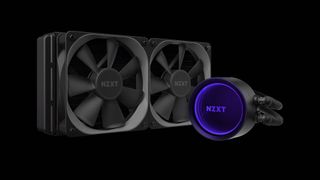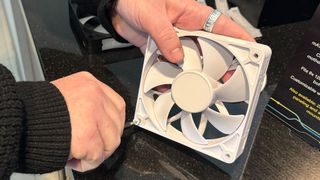
Frustrated by Loud Fan Surges and Resource-Hungry Software, Engineer Optimizes NZXT Kraken with Python Code

Maximize Speed with Corsair’s Innovative Single-Twist PC Fan Screw - Build Your Rig in Record Time
Chances are, whether you’ve built one PC or a hundred, securing the fans to your case probably doesn’t rank very high on the list of assembly pain points. There’s the tiny, poorly labeled front-panel headers that are nearly impossible to see as you plug them in; the even tinier M.2 screws that happily launch themselves into the abyss and then lodge themselves in the recesses of your half-built PC; or the GPU PCIe connector that often to wedges itself half in and half out of the slot in a way that makes you panic about breaking off an important piece of (probably) your most expensive component.
I could extend the above list quite a bit more before getting to the comparatively unproblematic self-tapping fan screw which, as far as I can remember, hasn’t changed in the nearly 30 years that I’ve been building PCs. But of course, just because something isn’t broken, doesn’t mean it can’t be improved – and that seems to be what Corsair has done with the screws for its upcoming fans and cases.
I tried out the improved screws with the company’s new iCue Link RX120 RGB fans, but a company rep tells me the screws won’t likely be included with iCue Link fans, but rather will likely debut with future cases to be determined, with an aim to make them available sometime after March.

(Image credit: Tom’s Hardware)
The RX120 fans, however, are a more affordable version of its QX120 / 140 RGB spinners, which the company says should sell for about $35 each (rather than $50 each for the QX models). They have fewer RGBs and a replaceable light diffusion side panel. And Corsair claims their noise-normalized performance is still right up there with the best from the likes of Noctua.

(Image credit: Tom’s Hardware)
Corsair’s redesigned fan screw has a much wider thread pitch, such that the screw goes all the way into a fan hole with one single rotation, rather than the several turns you’ll have to endure with traditional fan screws.
The screws do still require a fair bit of force as their threads dig into the plastic around the fan hole to hold themselves and your fans in place. Now, obviously, the reduced amount of threads means the screws likely aren’t technically as securely snug in your fan holes as traditional fan screws. But they definitely feel strong enough to keep fans where you want them. And as Corsair points out, the wider threads make for less wear and tear on the fan holes as you install and uninstall fans in your case(s).
LATEST VIDEOS FROM tomshardware Tom’s Hardware

(Image credit: Tom’s Hardware)
After a few minutes playing with Corsair’s new fan screws atCES 2024 in Las Vegas, I wouldn’t say they are revolutionary in the realm of PC building. But they seem to work well and are genuinely easier to install and remove than the traditional screws I’ve been using for decades. I feel like the screws are one of the little things you’ll likely want to hold onto and use and re-use in multiple builds.
And the good news is at some point, you won’t have to buy Corsair’s fans in order to add these new screws to your PC-building arsenal. A Corsair rep told me that the company will be selling these screws as a standalone product at some point, likely later this year. Are these screws likely to make a major dent in the difficulty level of PC builds? Not really. But they do seem to be a minor improvement, and it’s good to see companies thinking of small ways of streamlining one of our favorite hobbies. Now if only Corsair could manage to make all of its its cable-declutteringiCue Link system more affordable.
Stay On the Cutting Edge: Get the Tom’s Hardware Newsletter
Get Tom’s Hardware’s best news and in-depth reviews, straight to your inbox.
Contact me with news and offers from other Future brands Receive email from us on behalf of our trusted partners or sponsors
By submitting your information you agree to theTerms & Conditions andPrivacy Policy and are aged 16 or over.
- Title: Frustrated by Loud Fan Surges and Resource-Hungry Software, Engineer Optimizes NZXT Kraken with Python Code
- Author: George
- Created at : 2024-08-19 03:31:23
- Updated at : 2024-08-20 03:31:23
- Link: https://hardware-tips.techidaily.com/frustrated-by-loud-fan-surges-and-resource-hungry-software-engineer-optimizes-nzxt-kraken-with-python-code/
- License: This work is licensed under CC BY-NC-SA 4.0.

